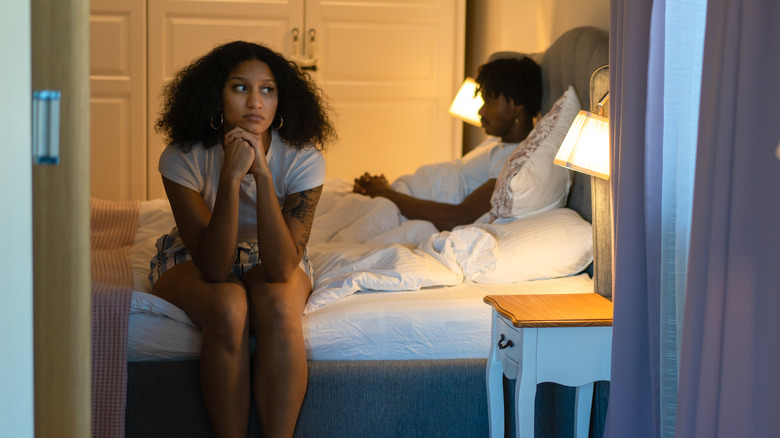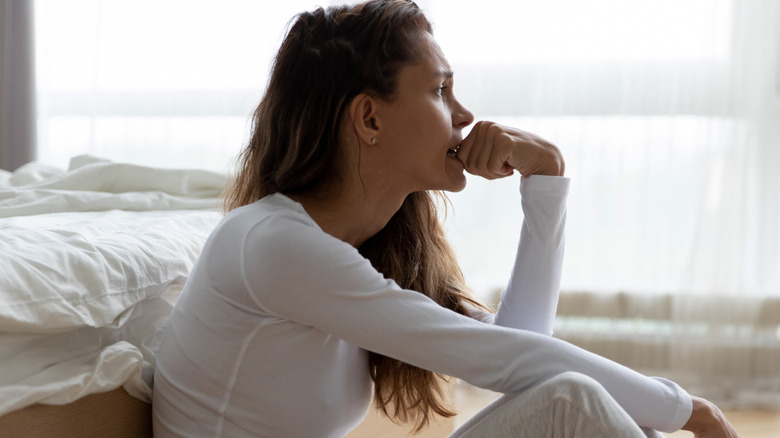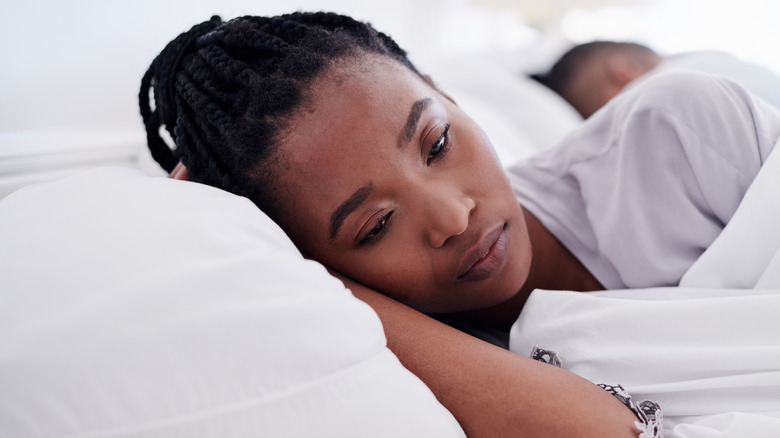Signs You're In A Relationship Just To Avoid Being Alone
No matter the culture you grew up in, there was probably a push for falling in love and being in a relationship. Who hasn't run into someone they haven't seen in a while and not been asked, "So, are you seeing anybody special?" Although there have been strides in normalizing being single and not wanting to join the ranks of those who have opted for the conventionalities of marriage and kids, there's still that sinking feeling that navigating this world solo is somehow a failure or says something about your ability to be loved. Of course, singledom means no such thing, but it can result in some people being in a relationship strictly out of fear of being alone.
"I tell my clients to use their fear as a motivator," licensed marriage and family therapist Anita Chlipala told Elite Daily. "Fear is a valid emotion just like any other and needs to be attended to. Don't minimize your emotions. If you are scared that you'll be alone forever, honor that feeling, but you must take action."
While there are upsides to being in a relationship, there are just as many, albeit different, upsides to being single. What's more, there's an even greater upside to not being in a relationship just to avoid being alone. As much as it might be hard to admit to yourself that your relationship exists out of fear, if the signs are there, you may want to think about whether it's time to abandon ship.
Your feelings are wishy-washy
When we fall in love, there are three stages: lust, attraction, and attachment. Although when attachment hits, that hot, fiery passion subsides, as it does in most relationships. But there's a difference between being happily and comfortably in love, as opposed to wondering if you even like your partner, let alone love them.
According to a 2021 study published in Psychological Bulletin, relationship satisfaction changes over time. It decreases between 20 and 40 years of age, then increases up to age 65. At that point, as the researchers found, satisfaction stayed stable. So, while yes, your feelings for your partner and your relationship will (and should) change, there's a difference between satisfaction and questioning if you can stand another two years, one year, or even six months with someone.
It's normal to have moments where you might not like or may even despise your partner, but if your feelings are so lukewarm that you have a "take it or leave it" mentality about them, then that's a set of emotions worth exploring.
You never argue
Couples are supposed to argue. They're supposed to have disagreements, then reach a resolution. But if there's no arguing being had, you should ask yourself why. Are you not arguing because neither one of you likes confrontation? Is conflict avoidance the issue? Or is it something deeper?
"Arguing is healthy because you get to [communicate] your frustrations and needs to your partner," sex therapist Courtney Watson, LMFT tells Bustle. "Another good thing about arguing is that you get to grow from it, whether that's by learning your triggers or your partner's triggers, uncovering an underlying hurt, or learning how you can be hurtful. Growth comes when you take the information from the argument and constructively apply it to repairing the relationship."
But if there's no desire to grow, nothing at stake, and a lack of care, then there will be no arguments. In fact, you'll never fight and never have a disagreement, because to do so would mean putting energy into something that you're feeling completely "meh" about.
The idea of the relationship is more important than the relationship itself
Since our relationship-centric culture has battered into our heads that the only way to live is to do so with a partner, if you put the relationship before your other half, then something is up. For some, there is a novelty in saying, "my partner," or "my fiancé," or "my spouse." But if the actual partner could be replaced and you wouldn't notice as long you still get to use those words, then you're probably in the relationship for the wrong reasons. The number one reason being that you don't want to be alone, because you've been conditioned to believe that any other option is unthinkable.
Alone? Single? For you, these are toxic terms because, in your mind, a relationship is an achievement that you've reached, not something that's steeped in love and growing together as partners. It's the ultimate goal and nothing else can compare to it.
You've suppressed parts of yourself
When you're in a relationship with someone out of fear of being alone, there's a good chance that you're not being your authentic self. Your thinking may be that in being who you really are, all your quirks, hang-ups, and idiosyncrasies are things you should keep under wraps, so you don't risk driving your partner away and putting you in the exact spot you fear most: being alone.
According to a 2009 study published in the Journal of Social and Personal Relationships, successful relationships need equal parts proximity and autonomy. What this means is that as much as it's important to be physically close, you have to retain yourself and who you are, and bring that to the relationship. But if there's a fear that being 100% yourself or letting your partner into all corners of your life — family, friends, coworkers — so they might see glimpses of the real you or how you behave when you're comfortable with others, then it's not healthy. Not only is it toxic for the relationship, but more importantly, it's toxic for you. Putting yourself on mute just so you're not alone? That's denying yourself the past that made you who you are, the present that impacts you, and the future of what you will flourish into.
You don't have a healthy perspective on being alone
Unless you genuinely prefer the company of yourself to everyone else, there's probably part of you that fears being alone — and that's normal! But there's a difference between being lonely and being alone. Loneliness can hurt, while being alone has power in it — if you choose to frame it that way. But if you continue to stay with someone out of fear of being alone, then your codependency strengthens while your authentic self continues to deplete.
"An unhealthy relationship means that the relationship box you are in is too small for each of you to be independent and separate, and you feel lost and frightened without the other person," sex therapist Tammy Nelson told CNN. "You may have been taught that this is what true love is — a soulmate that is your other half — but this is really codependency."
When you're so frightened to be alone that you're clinging onto someone else for dear life, you're creating your own prison that, even if you know you need to escape, you struggle to break free. Being part of this life means having periods, maybe long periods, of being alone. It means having fears, concerns, and doubts. Have the courage to let go of the weight that's holding you back so you can experience all realms of the human condition. The best place to start that journey is by ending a relationship you're in simply out of fear of being alone.





